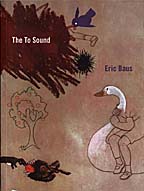 Eric Baus
Eric BausVerse Press ($12)
by Jane Sprague
We develop in the space between revolving and breath.
In the field of string theory, physicists research the order and organization of the universe on a micro-level. Here, numbers do not adhere to the ordinary rules of mathematics; the sum of three times five is not five times three when the universe is examined at its tiniest seams. In his debut collection, Eric Baus enacts a similar dynamic in poetry, engaging minerals, math, cartography, and sound itself to pull apart the micro-cosmology of language. His poetics is concerned with the meanings made possible through the strings of English syntax.
Arranged as a quasi-epistolary collection of five long poems, The To Sound revels in lyrical language and syntactical displacement as it maps a unique and humanly occupied universe. Aspects of longing and repeated failed articulation, or the attempt at untangling what was said as opposed to what was heard or intended, are woven throughout the book. Key images recur throughout the book: an elusive (and shifty) sister, geometry, alchemy, children, bodies, decomposition and renewal through gloss, through glass, and the constant mapping of space. Through collaged fragmented prose blocks, Baus forges a kind of re-puzzling, not only of language itself but also of human experience. The speaker repeatedly deconstructs and composes experience into language bound up with a spirit of dangerous play. In Baus's world, sometimes birds turn to ash, "eyes are quotation marks pulled across the sky," and compasses point to no true north when aimed at the geography of the human body. Sometimes language fails in its ordinary arrangement, and The To Sound is the answer to this failure, as in "The Sleeper Develops in the Chords of My Throat":
To collapse our necks with glass. To pronounce the latent hive in her chest.
Look we are a loom and a fissure straying.
The voice you hear means blind or ghost. Threads.
. . . . . . . . . . . . . . . . . . . . . . . . . . . . . . . . . . . . . . . . . .
She uses her radio voice to assess the tension in a phonograph.
To collapse her frames with utterance. To assess the embedded throat.
I am a chord and husk of that gloss.
From the section "A Swarm in the Aperture," this poem, like some others in the book, functions as a spin on Japanese Haibun. Thinking of sound as actual waves in air and human voice as thought, as sacred gift, Baus employs this strategy of echoes throughout The To Sound, repeating words (e.g., birds, ash, husk, collapse) that refer to earlier prose sections. Sound itself is used, collapsed, reconfigured, and revealed as the root of language, words becoming vehicles to express the nearly inexplicable task of charting the terrain of thought. Baus's poetry complicates the unpredictable compasses of memory, speech, emotion, and the desire to locate the speaker/voice in relation to human experience:
You are a. Too. Tuned to has. Ash.
You are the you and. The to sound. The utter the.
If I have to spit out all my teeth to stay in the.
The. Is it all to say the weight of the?
If I could stay lost to sound. If a single eye could say two.
Selected by Forrest Gander for the Verse Prize, The To Sound is an impressive debut. In it, Eric Baus gives rise to the alchemical cartography of sound disrupting language to reveal its construction through the complex alloy of the sentence and the potential of the sentence to reframe perspective.
Click here to purchase this book at your local independent bookstore

Rain Taxi Online Edition, Spring 2004 | © Rain Taxi, Inc. 2004
